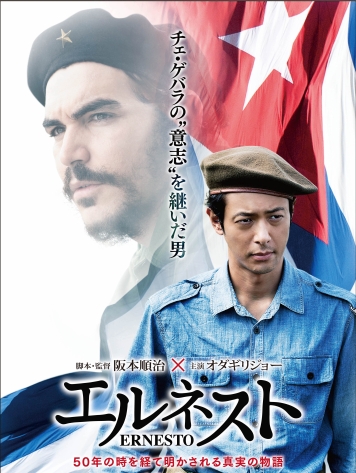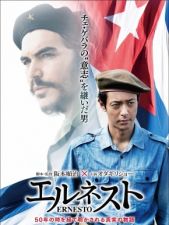Tuesday, September 19, 2017, 18:45 - 21:30
The fact-based story of the Japanese-Bolivian physician who fought with Che Guevara
Sneak Preview Screening: "Ernesto" followed by a Q&A session with
director Junji Sakamoto and star Joe Odagiri
Tuesday, September 19 at 18:45 pm*

*Please note early start time.
In Spanish and Japanese with English and Japanese subtitles
Japan, 2017 124 minutes
Director: Junji Sakamoto
Writer: Junji Sakamoto, inspired by the novel "The Samurai of the Revolution"
by Mary Maemura Hurtado
Producer: Yukiko Shiii
Starring: Joe Odagiri, Kento Nagayama, Juan Miguel Valero Acosta,
Alexis Diaz de Villegas
Film courtesy of Kino Films
At least three generations of Japanese have grown up wearing t-shirts emblazoned with the iconic image of Ernesto "Che" Guevara, Argentinian physician, author and Marxist revolutionary. But few of them know about Guevara's controversial exploits, and fewer still know that a Japanese-Bolivian fought with him - and died, like him, in a CIA-assisted ambush in Bolivia - 50 years ago this October.
Junji Sakamoto's new film, "Ernesto," pays tribute to that man, Freddy Maemura Hurtado, a second-generation Japanese-Bolivian who became radicalized hile in Cuba pursuing medical studies. Inspired by a novelized version of the story penned by Maemura's sister, Sakamoto has created a work that is at once Cold War history, compelling relationship drama and cautionary tale. It has also provided star Joe Odagiri with yet another foreign-language challenge (he speaks entirely in Spanish here). Unexpectedly, the actor disappears completely into the role, and delivers a slow-burn, career-best performance.
Born in Trinidad, Bolivia to a well-to-do Japanese father from Kagoshima Prefecture and a Bolivian mother, Maemura (Odagiri) was determined from childhood to become a doctor so he could treat the poor. In 1962, he arrives in Fidel Castro's Cuba to study not only medicine but also the "spirit of liberty and equality." Yet classes are soon disrupted by the US naval blockade, and the school becomes a barracks for anti-aircraft artillery troops for the duration of the Cuban Missile Crisis. Maemura and his classmates are given the choice of enlisting in the fight against America's presence, and the young physician's radicalization begins.
Maemura continues his studies against the backdrop of the escalating Cold War, but when civil war breaks out in Bolivia, he decides to slip back home and join Guevara's revolutionary army there. The guerrilla commander (Valero Acosta), a fellow physician-turned-rebel, bestows the nom de guerre "Ernesto Medico" on him. Their fates are further entwined when deep-jungle ambushes by CIA-backed Bolivian troops capture the men. Maemura's remains, which were missing until 1999, are now laid to rest alongside Guevara's in Santa Clara, Cuba.
A Japan-Cuba coproduction marking the anniversary of the men's deaths, "Ernesto" opens with a historic 1959 scene, shot in Hiroshima. Just months after the Cuban Revolution resulted in the ousting of US-backed dictator Fulgencio Batista, Che Guevara visits Japan in his role as diplomat for the communist government. Without notifying his hosts at the Foreign Ministry, he goes to the Hiroshima Peace Memorial Park to pay his respects. Then he turns to a Japanese journalist (Nagayama) who had followed him there. "Why aren't you angry at the Americans?" he demands. "They did horrific things to you." It is a question that hangs heavily over the entire film.
Please join us for this sneak preview of "Ernesto" ahead of its Japanese release on October 6.
For more (in Japanese): http://www.ernesto.jp
JOE ODAGIRI is one of just a handful of Japanese actors who are international stars. He came to notice in Kiyoshi Kurosawa's "Bright Future" in 2003, and immediately began amassing acting awards. He won Best Supporting Actor at the Japanese Academy prizes for Yoichi Sai's "Blood and Bones" in 2004, and Best Actor for "Sway" in 2006. He also earned nominations at the Asia-Pacific Film Festival and Asian Film Awards for "The Great Passage" (2013). Odagiri has acted in English, French and Korean, has a prolific TV career, and has been active overseas since 2006, starring in Atsushi Funahashi's "Big River," Nelson Yu Lik-wai's "Plastic City," Kim Ki-duk's "Dream," Tian Zhuangzhuang's "The Warrior and the Wolf" and Kang Je-gyu's "My Way," among others.
Director JUNJI SAKAMOTO won a slew of awards for his 1980 debut, "Knockout." In 2000, he won the Japan Academy's Best Director Award, among many other prizes, for "Face." He was nominated for the Golden Bear at the Berlin International Film Festival for "KT" in 2002, and was in competition at the Karlovy Vary International Film Festival with "Out of this World" (2004, starring Joe Odagiri). Other highlights include "Children of the Dark," "A Chorus of Angels," "Human Trust" and last year's "The Projects," which memorably reunited Sakamoto with Naomi Fujiyama, the star of "Face."
Please make your reservations at the FCCJ Reception Desk (3211-3161) or register below. You may attend the Q&A session without attending the screening, but you will not have seating priority. Please reserve in advance, still & TV cameras inclusive. All film screenings are private, noncommercial events primarily for FCCJ members and their guests.
- Karen Severns, Film Committee


